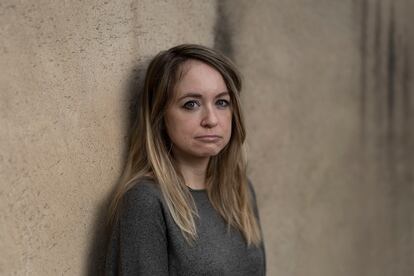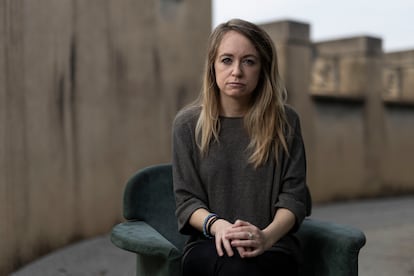Sally Hayden, journalist: ‘Our taxes support dictators, warlords and systems that exploit other human beings’
The Irish journalist, who specializes in migration, is the author of ‘My Fourth Time, We Drowned,’ which was awarded the Orwell Prize for Political Writing in 2022

A person doesn’t always decide what they’re going to dedicate their life to. Sometimes, the cause chooses the person. This is what happened to Sally Hayden, 35, an Irish journalist. More than five years ago, she began receiving messages from migrants in detention centers requesting her help. She became deeply involved, building a wide network of contacts. Coverage of the so-called “migrant crisis” became the center of her work. The result is the book My Fourth Time, We Drowned (2022), which has won several awards, including the Orwell Prize for Political Writing.
Question. There’s a lot of talk about migration in Europe, but do you think that public opinion is even aware of the hell that migrants go through?
Answer. No, the European public debate is totally separated from the human experiences of those who want to come to Europe. Even the concept of “migrants” is dehumanizing. They’re people [like anybody else], with hopes, dreams, families. We often lose sight of the fact that the real crisis we’re experiencing is a crisis of global inequality. A large part of humanity doesn’t have the legal capacity to travel and gain access to visas. The result is that many journeys are desperate and dangerous.
Q. There’s a certain stereotype of migrants in society. Do these stereotypes resemble the people you’ve met, who make the journey from North Africa to EU nations?
A. The problem is that they’re often treated as if they were a homogeneous group, when they’re not. They come from very different places and the causes that pushed them to leave their homes — their personal circumstances — are very different. I’ve met very different people in the detention centers in Libya: artists, law or medical students, dentists... some are from West Africa, others from East Africa. They’d never had contact with someone from the other end of the continent before.
Q. In the book, you emphasize that the EU and the UN hold a lot of responsibility for the ongoing human rights abuses taking place in countries such as Libya. Does this complicity reach the highest levels?
A. Yes, of course. Something I discovered when I started the research is that the EU has a much more active role in the situation. Its leaders know this — they do it on behalf [of the citizenry]. Their justification is that [EU] citizens want these policies. But I believe that public opinion doesn’t understand the ramifications of European policy, which means locking up entire families in places where serious abuses are committed. Many even die there.
The EU has a direct responsibility for the return of people who are intercepted at sea to detention centers in Libya, which Pope Francis has called “concentration camps.” Our taxes support dictators, warlords and systems that exploit other human beings. And that’s a problem not only limited to Libya: the EU’s anti-immigration policy has harmful effects on all its borders.
Q. For many, even if they are formally recognized as refugees, the nightmare doesn’t end if they manage to attain legal status in Europe.
A. Yes, because often, once the danger has passed, the trauma appears. [This is] when the mind tries to digest everything that has happened. Many suffer from post-traumatic stress, insomnia and other disorders. Having to recount these horrors [to the authorities] repeatedly during the process to regularize their status doesn’t help.
Q. To what extent is the media also responsible?
A. It’s difficult to talk about the media in general. It’s true that the issue of migration is covered… but many times, it’s to reflect and reproduce the dehumanizing rhetoric of politicians. Other times, we talk about the victims in the Mediterranean as simple numbers. The voices of those who suffer from this situation are ignored. We have to listen to them more carefully. That’s what I tried to do while writing this book. One of the problems with covering the issue is that many journalists don’t have sufficient resources — including time — because their outlets don’t cover the expenses that [proper coverage] requires..

Q. Why do you think European public opinion is so insensitive?
A. We live in strange times. On the one hand, it’s very easy to find out what’s happening on the other side of the world, but it’s also easy for many people to ignore this problem, not to take responsibility. But if we look at the causes of migration, they often have to do with our actions. In Senegal, large foreign boats are emptying the fish stocks that local fishermen rely on. In Somalia, the drought linked to climate change condemns a society to hunger… a society that has barely emitted polluting gasses. Thousands of people have already died from this.
Q. If there’s no pressure from the general public, could the change in policies come via court resolutions?
A. The International Criminal Court is investigating European perpetrators for crimes against humanity. My articles have been used as evidence. Perhaps these legal battles will be successful and will be able to change reality [and achieve more results] than some journalistic reports. It’s tricky: this entire situation occurs because European countries need migration to fill many vacancies in their labor markets.
Q. To what extent does being so close to these difficult cases affect you on a psychological level?
A. You often feel guilty because you missed a message, or because you didn’t respond in time. Since having phones is prohibited in detention centers, the time when [the people being held there] can write to you is at night, sometimes at three in the morning. The [success] of this book is theirs — many have risked their lives to get information out. They’re the ones who have truly suffered and who need to be at the center of the story, not me.
Q. Will you continue covering immigration issues in the future?
A. Yes, I’m not going to stop.
Sign up for our weekly newsletter to get more English-language news coverage from EL PAÍS USA Edition
Tu suscripción se está usando en otro dispositivo
¿Quieres añadir otro usuario a tu suscripción?
Si continúas leyendo en este dispositivo, no se podrá leer en el otro.
FlechaTu suscripción se está usando en otro dispositivo y solo puedes acceder a EL PAÍS desde un dispositivo a la vez.
Si quieres compartir tu cuenta, cambia tu suscripción a la modalidad Premium, así podrás añadir otro usuario. Cada uno accederá con su propia cuenta de email, lo que os permitirá personalizar vuestra experiencia en EL PAÍS.
¿Tienes una suscripción de empresa? Accede aquí para contratar más cuentas.
En el caso de no saber quién está usando tu cuenta, te recomendamos cambiar tu contraseña aquí.
Si decides continuar compartiendo tu cuenta, este mensaje se mostrará en tu dispositivo y en el de la otra persona que está usando tu cuenta de forma indefinida, afectando a tu experiencia de lectura. Puedes consultar aquí los términos y condiciones de la suscripción digital.








































